Suzanne Lazaroo
1 November 2024: Helping to ensure Canberra’s water security, reducing falls risks for older people, and bringing new life to community spaces – University of Canberra research impacts Canberrans throughout their lives, and the newly-launched Life of a CBRn installation and website brings this impact to life.
The month-long installation at the Canberra Centre will be a hub of research storytelling, with researcher drop-in sessions to engage community members, interactive activities for kids, and more.
The Life of a CBRn launch also marks the start of the University’s Research Festival, which will run until 28 November. Now in its third year, the Research Festival is moving beyond the University’s Bruce campus, with over 20 free public events to be held across Canberra.
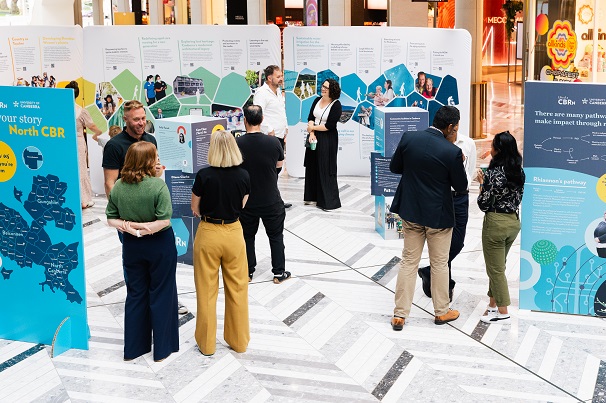
The annual event is a showcase of the impact of the University’s research on the community and region, providing opportunities to create connections and explore the potential to solve complex problems together, says Deputy Vice-Chancellor Professor Michelle Lincoln.
“Research impact is the important contribution research makes to the economy, society, environment, and culture, beyond academia – and is a key focus in our commitment to Canberra,” she said.
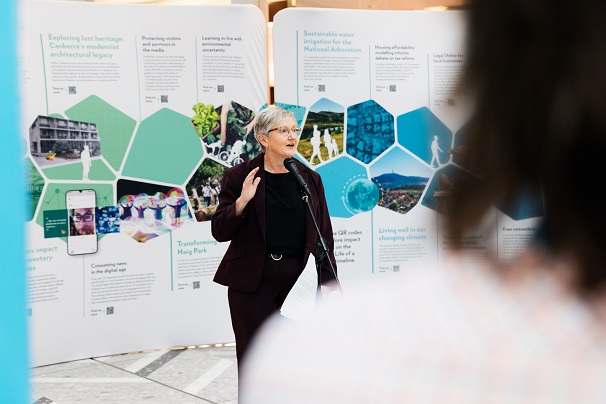
Designed as a timeline to be explored at your own pace, the Life of a CBRn pop-up is a flagship event under the banner of the Festival. The exhibition highlights research case studies that correspond to a Canberran’s life stages and experiences. The exhibition illustrates exactly how each case study makes its presence felt in the daily lives of Canberrans.
Each snapshot links to a case study on the University’s website that offers more detail on the projects. The timeline can also be explored online at lifeofacbrn.com.au.
One of these research-driven projects is Country as Teacher, delivered through the Affiliated Schools program, a partnership between the Faculty of Education and the ACT Education Directorate.
Country as Teacher educational practices honour Indigenous ways of being, knowing and doing.
Local primary school teacher and research participant Jordan Harrison sees the program as an opportunity to take the lead in necessary societal change.
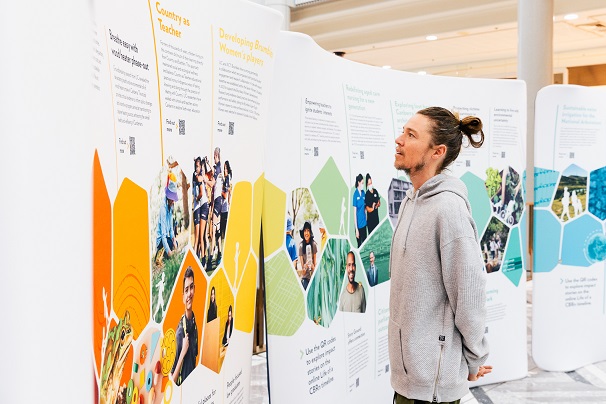
“[The concept of] Country as commodity, resource, background and humans as consumers, developers and owners, has an impending expiry. Country as teacher, kin, foreground and humans as custodians, shines a glimmer of hope into the future,” he said.
“As a teacher, the Country as Teacher program encourages me to integrate cultural integrity and student-led inquiry to achieve local stewardship. These principles and philosophies bring excitement, energy and meaning to my day-to-day teaching work.”
Mr Harrison feels that the Research Festival is an important initiative to bring together passionate people to discuss and share what they are doing within communities. “As well as why we are doing it, and how we can improve,” he said.
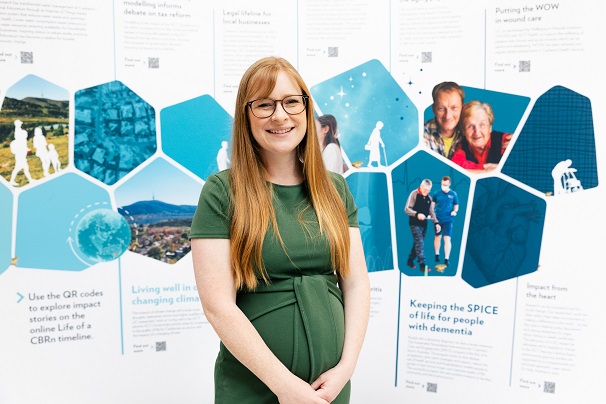
As part of the Festival, Faculty of Health PhD student Ashleigh Marchant will lead the From Heatwaves to Moonwalks: Understanding Human Health and Movement event, which draws on her research contributions to a project originally focused in space – but now with very earthly applications.
Developed by University researchers at the University of Canberra Research Institute of Sport and Exercise (UCRISE), the world-leading testing method for proprioception has its original focus in space – but has now also found very earthly applications.
The method is being used in collaboration with NASA to help astronauts readjust to life on earth – and this has led to work on early detection of falls risk in older people.
A qualified physiotherapist, Ms Marchant decided to pursue her PhD after becoming intrigued by how the human body adapts to extreme conditions, such as low/zero gravity.
“My research focuses on ankle somatosensation in low gravity environments – somatosensation is the sense of knowing where our body is positioned in its environment,” she said.
Representing the University at a NASA conference in 2023, Ms Marchant said that it was wonderful to see the impact of the team’s research in this field.
“The primary goal of the work is to assist astronauts, however there are so many avenues that this knowledge can be applied to – personally, a deeper understanding of the human body has assisted me clinically as a physiotherapist, to understand my patients in new perspectives,” she said.
Ms Marchant is looking forward to the larger Research Festival as a great place to share knowledge and a platform for students looking to explore research careers.
“I often keep to within my faculty, but an event such as this provides an easy and interactive way to learn more about the faculties around me and to engage in the exciting work happening within UC and beyond,” she said.
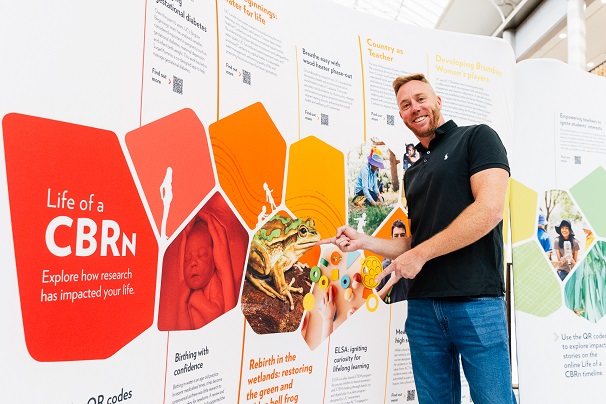
Learn more about research addressing environmental challenges with a research project that aims to bring back the distinctive call of the green and golden bell frog to the soundtrack of ACT wetlands.
The species has been driven to extinction in Canberra by the chytrid fungus, a global threat to amphibians – but Associate Professor Dr Simon Clulow and his team from the Faculty of Science and Technology have come up with novel landscape interventions to address the problem.
“Our project helps connect community to local species and ecosystems through hands-on involvement in our research and raising awareness of local and international environmental issues,” Dr Clulow said.
“At the ecosystem level, it is widely considered that ecosystems are dependent upon frogs and that humans would likely not survive without them.
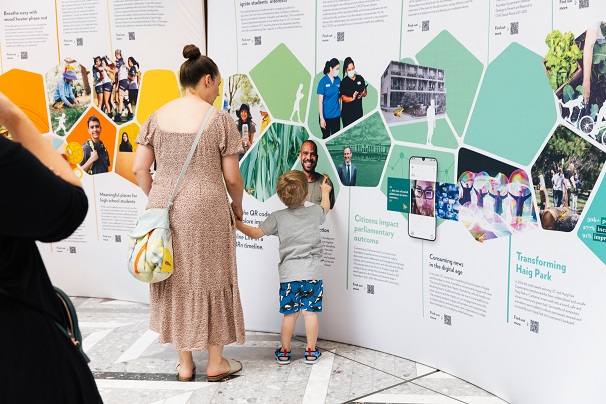
Once it comes to fruition, this project will not only help to restore local frog species and communities, but potentially develop a blueprint for ways to recover frog species around the world. For Dr Clulow though, it has a very personal resonance.
“While the global impact of our research is obviously very exciting, I can honestly say I am most excited about the thought that we might actually have a locally extinct frog hopping around ACT wetlands again in the near future,” he said.
“I am a total frog nerd, and dream of the day when I can one day walk through my local park and hear a chorus of green and golden bell frogs calling from a local wetland. They sound like a motorcycle revving up through the gears – waaark, waaaaaaark , waark, waark – a beautiful sound that is hard to miss!
“I think events like the Research Festival are so important because they provide a way to connect directly with local community. Engagement with community is critical – it is the local community that is both beneficiary and custodian of local, healthy ecosystems. If the community doesn’t care, we are fighting an impossible battle.”
To find out more about the University of Canberra’s Research Festival 2024, download the program or register for the free events via the main event website.
Life of a CBRn is located in the Ground Floor Foyer of the Canberra Centre, outside the Dangerfield and LEGO stores (next to Bunda Street) throughout November 2024. From December, it will move to the University.


